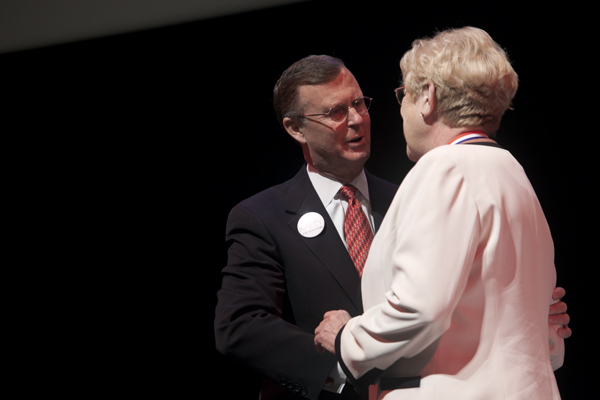Ransdell stresses retention at President’s Convocation
August 22, 2011
Inspire and support your students — that’s the message President Gary Ransdell sent to faculty and staff at Monday morning’s President’s Convocation.
“We have to do all we can to help the students that we accept to graduate,” Ransdell said. “We must control our own destiny as a university.”
After beginning his speech by recognizing the new faculty, staff and administration members, Ransdell followed by outlining some of WKU’s achievements throughout the course of the past year.
He encouraged faculty and staff to adopt a “renewed focus on planning for the future.”
Many students on campus are capable of winning competitive scholarships, such as Fulbright Scholars or Barry M. Goldwater scholarships, and receiving recognition. But Ransdell said they don’t pursue them because they are simply not aware of the opportunities, he said, adding that those students need encouragement from faculty. “This is what a good university does,” he said.
Retaining students was also a key issue in Ransdell’s convocation speech.
Last year, the cost to educate first-year students who did not return for their sophomore year at WKU was $8.5 million, he said. Additionally, more than 1,000 students are lost from each freshman class.
This is relatively good compared to other public universities in Kentucky, Ransdell said. However, a 1 percent increase in retention, which is about 40 students, would add a about $1 million in revenue to the base budget.
To help decrease the number of students who fail to complete their degree, WKU has developed a retention task force. The task force’s goal will be to strategically intervene with students who are at-risk of dropping out, Ransdell said.
Ransdell outlined four major steps in the task force’s process — getting students in, through, around and out of college — with a degree.
Non-academic measures were also addressed in Ransdell’s speech, including updates on the capital campaign and construction.
Within the next year, the university plans to reach and exceed the $200 million capital campaign goal in the New Century of Spirit campaign, as well as develop a new campus action plan, he said.
In the future, when state funds are more likely to be available, renovations to the Thompson Complex Central Wing and the Planetarium will be made, and the construction of a new College of Business will follow.
Ransdell said these construction efforts are made to keep WKU’s campus a “pleasant, comfortable, safe and inspiring place to live in the world.”
Ransdell closed his remarks by again encouraging faculty and staff to make a difference in student’s lives.
“Effort and attitude are everything,” he said. “We cannot sit still — we must continue to pursue a bold destiny for WKU.”













